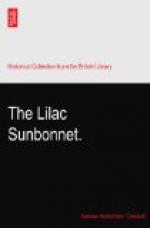“That’s the minister’s Hebrew Bible book, no doubt,” she said. “For that’s the same kind of printing as between the double verses of the hundred-and-nineteenth Psalm in my grandfather’s big Bible,” she continued, sapiently shaking her head till the crispy ringlets tumbled about her eyes, and she had impatiently to toss them aside.
She laid the Bible down and peeped into the other strange-looking book. There were single words here of the same kind as in the other, but the most part was in ordinary type, though in a language of which she could make nothing. The note-book was a resource. It was at least readable, and Winsome Charteris began expectantly to turn it over. But something stirred reprovingly in her heart. It seemed as if she were listening to a conversation not meant for her. So she kept her finger on the leaf, but did not turn it.
“No,” she said, “I will not read it. It is not meant for me.” Then, after a pause, “At least I will only read this page which is open, and then look at the beginning to see whose it is; for, you know, I may need to send it back to him.” The back she had seen vanish round the Far Away Turn demanded the masculine pronoun.
She lifted the book and read:
“Alas!” (so ran the writing, fluent and clear, small as printer’s type, Ralph Peden’s beautiful Hellenic script), “alas, that the good qualities of the housewives of Solomon’s days are out of date and forgotten in these degenerate times! Women, especially the younger of them, are become gadabouts, chatterers in the public ways, idle, adorners of their vain selves, pamperers of their frail tabernacles—”
Winsome threw down the book and almost trod upon it as upon a snake.
“’Tis some city fop,” she said, stamping her foot, “who is tired of the idle town dames. I wonder if he has ever seen the sun rise or done a day’s work in his life? If only I had the wretch! But I will read no more!”
In token of the sincerity of the last assertion, she picked up the note-book again. There was little more to read. It was at this point that the humble-bee had startled the writer.
But underneath there were woids faintly scrawled in pencil: “Must concentrate attention”—“The proper study of mankind is”—this last written twice, as if the writer were practising copy-lines absently. Then at the very bottom was written, so faintly that hardly any eyes but Winsome’s could have read the words:
“Of all colours I do love the lilac. I wonder all maids do not wear gear of that hue!”
“Oh!” said Winsome Charteris quickly.




